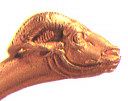
site map
Golden Fleece > Jephthah
craftsman's art and music's measure
for thy pleasure all combine.
Jephthah
the stone rejected by the builders
Through faith Jephthah subdued the Ammonites, who had been harassing the Gileadites on the east bank of the Jordan. Jephthah was recalled from exile to save his people from the oppression of these invaders. His leadership began with an act of wise diplomacy, which demonstrated a knowledge of his nation's history and invited the Ammonites to withdraw. Finding this ineffectual, he attacked the Ammonites and YHWH delivered them into his hands.
The jealousy of the Ephraimites was aroused because they had not been summoned to participate in this victory. They picked a quarrel with Jephthah, thrusting on him a civil war not of his own making. Once again he did his best to avert strife. He reasoned and pleaded with the arrogant Ephraimites but found no response. After defeating the Ephraimites, Jephthah secured the fords on the river Jordan with an ancient Hebrew word, which was pronounced differently by Ephraimites and Gileadites. In different contexts shibboleth may mean either an "ear of grain" or a "torrent of water". The word shibboleth also begins with the first letters of Shechem and Bethel, places of great significance in the stories of Abraham, Jacob and Joshua.
The same two consonants also begin the name of Subiaco, where Benedict lived a life of solitude and prayer for about three years and began work one of the most important factors in the development of Christian Europe; a pattern of life designed to be at the same time useful to man and pleasing to God.
"Listen carefully, my son, to the Master's instructions, and attend to them with the ear of your heart. This is advice from a father who loves you; welcome it, and faithfully put it into practice. The labor of obedience will bring you back to him from whom you had drifted through the sloth of disobedience. This message of mine is for all, and armed with the strong and noble weapons of obedience to do battle for the true king, Christ the Lord." (the Rule of St. Benedict, Prologue, verses 1-3)
Copyright © 2001-2009 The Fleece. All rights reserved.